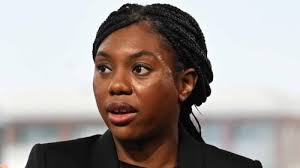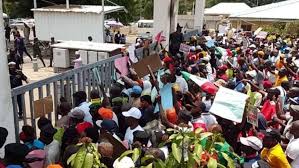
Half truths, many lies: Fact-checking Kemi Badenoch
Kemi Badenoch has continuously tarnished her Nigerian roots since becoming the head of the Conservative Party in the UK. She has presented her childhood as a sombre story of destitution, deteriorating infrastructure, moral decay, corruption, brutality by the police, and poor leadership. Her comments have sparked social media firestorms, with multiple recordings going viral. a few of her recent contentious assertions.
First Claim
"I grew up in a poor nation, and I saw my relatively wealthy family's fortune go due to inflation, even though they worked harder and harder. With my father's final £100, I returned to the UK at the age of 16 in the hopes of a better life.
Findings
Kemi Badenoch (née Adegoke) was born on January 2, 1980, in Wimbledon, London, to Nigerian parents Femi and Feyi Adegoke, according to a number of publications, including the UK Independent and The Times.
She has a sister named Lola and a brother named Fola, making her the oldest of three children. Femi, her father, practiced general medicine in Lagos. Iwosan Clinics, situated on Itire Road in Surulere, Lagos, was owned and run by him. He was an activist for Yoruba nationalism before dying of a brain cancer in 2021.
The mother of Kemi was a student at Queen's School in Ibadan. After 43 years of service, she retired in 2020 as a professor of physiology at the University of Lagos. She spent fifteen years as a professor and was president of the Nigerian Society for Endocrinology for four years. It was confirmed that she supervised the Ph.D. theses of many illustrious alumni of the school, including the current head of the department.
Multiple sources revealed that Kemi spent her early years in Lagos, Nigeria, where she attended the International School Lagos, a private institution, and graduated in 1996 before returning permanently to the United Kingdom at 16.
In a tweet dated January 22, 2025, a Lagos-based tax consultant, Kayode Okunola, accused Badenoch of distorting her family’s history to fit a narrative of hardship.
“Dear @KemiBadenoch, stop lying about your background. You were never from a poor family! Your grandmother, ‘Iya Ondo,’ was a prominent lace and damask merchant on Kosoko Street in Balogun Market. Your mum was a professor at the Lagos University Teaching Hospital. Your dad owned his clinic, your uncle was a dentist, and your aunt was among the Nigerian students recruited from the USA to the Central Bank of Nigeria,” Okunola wrote.
“If you were poor, what happened to the rest of us who prayed to come from families like yours? Your claims mock the memories of those who genuinely struggled without the opportunities your privileged upbringing afforded you. Please stop!” he added.
In an interview, Okunola further shed light on the privileged status of Kemi’s family.
He said, “I knew her family well. My family and the Adegokes attended the same church—St. John’s Anglican Church, Aroloya, Lagos Island. Her grandmother, ‘Iya Ondo,’ was a renowned figure in Balogun Market, selling premium fabrics, which weren’t for poor people. Her father owned Iwosan Hospital in Surulere, and her mother was a prominent figure in the Physiology Department at the University of Lagos.
Few people could afford private schools like the International School Lagos, where Kemi attended, back then. It was a school for the offspring of elites and professors. The majority of us went to public schools. Simply put, Kemi's assertions of poverty are false. Her story trivialises the hardships of truly impoverished Nigerians and distorts her upbringing.
Kemi lied about her family becoming impoverished, according to former Foreign Affairs Minister Bolaji Akinyemi, who supported Okunola's claim.
"How can the daughter of a professor at UNILAG (University of Lagos)—her father was a doctor—a girl who attended the International School at UNILAG make it sound like she was selling groundnuts and water in Lagos to make money?" Akinyemi asked on Channels Television's Politics Today.
Second Claim
I am a Nigerian, according to everyone. I identify more with my own ethnic group than I do with the nation.
Findings
Evidence suggests that Kemi actively embraced her Nigerian ethnicity in the past, despite her current downplaying of it.
Using the hashtag "Nigerians for Kemi Badenoch," she aggressively solicited support from the Nigerian community in 2010 while running for representation in the UK Parliament from the diverse Dulwich and West Norwood seat. Kemi engaged with Nigerians in the constituency by highlighting her Nigerian heritage, according to a campaign brochure that went viral on social media.
"Hello everyone, as you are all aware, I am a candidate for Parliament in the 2010 UK general elections for Dulwich & West Norwood," she said in the document. I need your assistance because the race is so close.
"With only roughly 20 days till election day, Nigerians have been outstanding. My close friends, former classmates, their friends, and our families have come together and shown a great deal of support.
"I was abused by a caller in a recent BBC interview because I'm Yoruba. That a Nigerian woman who says she has lived in London for forty-five years was more upset by my Yoruba heritage than my political beliefs—and that she shamefully said it on national radio—delighted me greatly.
"It is imperative that we try to help one another instead of fighting one other. It would be fantastic to have a Nigerian in parliament, regardless of party affiliation, who won solely on the basis of merit rather than via nepotism or election-buying.
"So, I'm requesting your assistance right now to help a Nigerian who is attempting to do something amazing here and enhance our country's reputation."
Third Claim:
"My true identity is Yoruba, and I will not be grouped with Nigerians from the north, who were our ethnic enemies, just because they are called Nigerians." I have nothing in common with the people who live in the country's north, where Islamism and Boko Haram are prevalent.
Findings
There is no historical support for Kemi's assertion that Northern Nigerians and Yoruba are ethnic rivals. Although there have been conflicts throughout the nation's history, such as political and ethnic difficulties during the Nigerian Civil War, the Yoruba and Northern Nigerians have generally had cooperative relationships.
Yoruba and Northern traders, for example, have a long history of trading together, especially in markets and cities like Lagos and Kano. Additionally, political ties between Hausa/Fulani and Yoruba leaders, like Ahmadu Bello and Chief Obafemi Awolowo, demonstrate cooperation rather than hostility.
Northern Nigeria is divided into 19 states, and although Islam is the most common religion there, many Christians also call it home. similar to the South-West's Muslim population. In contrast to Kemi's portrayal of the North as solely Islamic, the region is home to a significant christian population. States like Plateau, Benue and Adamawa have large Christian communities, while others like Borno and Yobe have Muslim majorities, but are not exclusively Islamic.
In a post on 13th December 2024, former presidential aide Reno Omokri stated that Kemi demonstrated a surprising level of ignorance when she said Boko Haram and Islamism resided chiefly in the North.
“First and foremost, that statement is inaccurate. There is much more to Northern Nigeria than Boko Haram. In fact, there are nineteen states in Northern Nigeria, and even in its heyday, Boko Haram was limited to just three of those states: Borno, Yobe, and Adamawa,” Omokri wrote.
Claim 4:
“Coming to the UK, my experience with the British Police was very positive. The police in Nigeria will rob us. When people say I have this bad experience with the police because I’m black, I say well…I remember the police stole my brother’s shoe and his watch.”
Findings
There are truly some bad eggs in the Nigeria Police Force. Increasing police brutality and extortion led to movements such as the #EndSARS protest. However, even the United Kingdom is not completely free of bad cops.
For instance, in 2015, a 31-year-old black man, Sheku Bayoh, died after being restrained by police officers in Kirkcaldy, Scotland. The officers reportedly used CS gas and a combination of physical restraint techniques, including kneeling on Bayoh’s back.
Similarly, in 2011, a 29-year-old black man, Mark Duggan, was shot and killed by police officers in Tottenham, London, following an attempted arrest. The police claimed he was armed, but evidence later showed that he was unarmed when he was shot.
Also in 2016, the British Broadcasting Corporation reported that three Metropolitan Police officers were sentenced after stealing cash and other items from crime scenes. These indicate that elements of police brutality and extortion or theft are not limited to Nigeria police.
Ex-envoy cautions Kemi
In his TV appearance, former Foreign Affairs Minister Akinyemi warned Kemi against staking her political career on thin ice.
She would quickly discover that sacrificing your people and culture to further your profession is not a good idea. She will quickly realise that she is making a mistake.
Ultimately, there is currently a right-wing political party in the UK that is even more conservative than the Con





